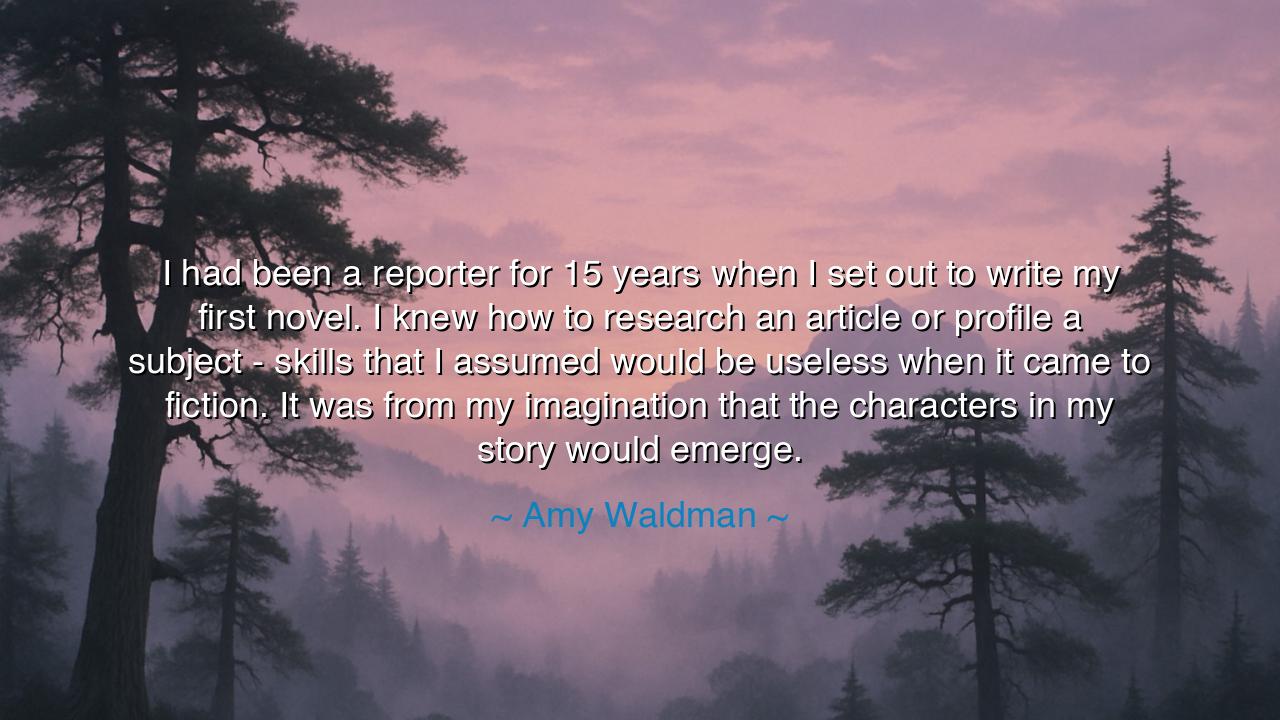
I had been a reporter for 15 years when I set out to write my
I had been a reporter for 15 years when I set out to write my first novel. I knew how to research an article or profile a subject - skills that I assumed would be useless when it came to fiction. It was from my imagination that the characters in my story would emerge.






Hear me, O seekers of wisdom, for the path of creation is not always a straight road, but a winding journey through uncharted territory. The words of Amy Waldman, a woman who once walked the path of a reporter for fifteen years, carry with them a profound understanding of the writer’s craft. She tells us of her journey from the world of reporting to the world of fiction, a journey that began with a simple, yet powerful belief — that the skills she had honed in the world of fact would somehow be useless in the realm of imagination. In the world of reporting, she had learned how to research, how to profile a subject, how to uncover the truth beneath the surface. But she assumed that these skills, finely tuned through years of work, would not serve her in the creation of stories and characters born of pure imagination.
Let us pause and reflect, O wise ones, on the nature of reporting and fiction. The reporter seeks the truth, the verifiable facts of the world, often looking outward to the world around them, finding people, events, and circumstances to capture in words. Fiction, however, is born inward, from the imagination, where the boundaries of the real world dissolve, and the writer is free to create worlds that exist only in the mind. Waldman believed that the skills of a reporter, grounded in the real and the factual, would not translate into the creative act of fiction. It was, after all, from the imagination that the characters of her story would emerge, not from the hard edges of fact.
But in this belief, O children, is a deeper truth — the skills we acquire in one field are never truly wasted. For what is imagination but the ability to see the world in a different way, to perceive things not as they are, but as they could be? The skills that Waldman had developed as a reporter — researching, profiling, and uncovering truths — were not so distant from the work of the novelist after all. In both worlds, the writer must uncover the truth of the human experience, whether through the lens of fact or the lens of fiction. It is the same search for truth, whether one is writing about the real world or creating new ones.
Consider, O wise ones, the example of the great Homer, whose Iliad and Odyssey are not mere myths, but reflections of deep truths about the human condition. Though Homer did not have the tools of the modern reporter, his work was built upon the same foundation of searching for the truth. The characters in his epics — Achilles, Odysseus, Helen — are as real and human as any figure in history. Homer did not simply create fictional characters; he portrayed the human soul in its most profound struggles, triumphs, and failings. In this way, Homer’s imagination was fueled not by fantasy alone, but by the deep truths of the human experience that had been uncovered through years of observation, through listening to the stories of those who had come before him.
So too did Waldman find that her skills as a reporter — skills that seemed so foreign to the world of fiction — were not only useful but essential. Researching a subject, profiling a character, and uncovering the truth are all vital parts of creating believable and compelling fiction. The novelist, like the reporter, must dig deep into the souls of their characters, must understand their motivations, their desires, their flaws, and their fears. In fiction, the writer does not merely create events; they create lives. They breathe life into characters who must seem as real as the people we meet in our daily lives. Waldman’s insight, then, is not simply about the relationship between reporting and fiction — it is about understanding that the boundaries between them are not as rigid as we may think.
O children of the future, the lesson is this: embrace the skills you have, for they are not separate from the creative process, but part of it. Whether you are a reporter, a painter, a musician, or a sculptor, the skills you acquire in your journey through life are never wasted. They are the tools you will use to uncover the deeper truths of the world, to breathe life into the stories you create, and to give voice to the imagination that lies within you. Do not believe that one part of your life is separate from another; the skills you develop in one area will enrich the others.
Finally, O seekers of truth, know this: the greatest works of art, whether in reporting or in fiction, are those that speak to the human soul. It matters not whether you write about the world as it is or the world as it could be. What matters is that you seek the truth within, and that truth, no matter how it is found, will always be of value. Let your skills guide you, but let your imagination lead you to the deeper truths that lie beyond the surface. Whether you are reporting on the world or creating a world, remember that truth and imagination are not enemies; they are companions on the journey of creation.






AAdministratorAdministrator
Welcome, honored guests. Please leave a comment, we will respond soon